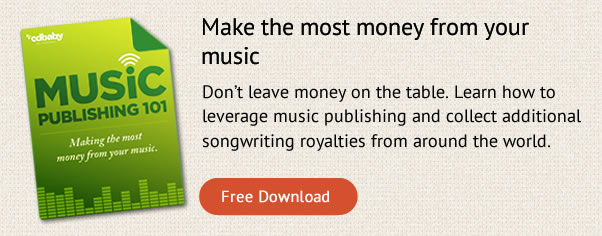 Ok, sure — if you’re going into entertainment or IP law, there’s plenty more to understand about PROs and the intricacies of music publishing.
Ok, sure — if you’re going into entertainment or IP law, there’s plenty more to understand about PROs and the intricacies of music publishing.
But for your average independent musician, understanding the basics of performance royalties and how they’re collected/distributed should suffice. So let’s get started. First…
What is a Performing Rights Organization?
As you may already know, music publishing is one of the most important revenue generators for an artist that writes original material.
Performing Rights Organizations (or PROs) help songwriters and publishers get paid by collecting one of the most important forms of music publishing revenue: performance royalties.
[To read about the various kinds of publishing royalties you can generate through the usage of your music, click HERE.]
As a songwriter, composer, or lyricist, you’re owed a “performance royalty” any time your music is played on radio stations (terrestrial, satellite, and internet), used on TV shows or commercials, or performed in live venues.
Those performance royalties are paid by radio stations, venues, and TV networks to Performing Rights Organizations like ASCAP, BMI, SESAC, and SOCAN (in Canada). The PRO then distributes the money to their affiliated songwriters and publishers.
[For a complete list of copyright collection societies worldwide, click HERE.]
Do independent musicians that aren’t getting played on the radio need to affiliate with a PRO?
“Need” is a strong word. But you SHOULD!
Some publishing experts claim that the amount of performance royalties distributed to songwriters and publishers each year accounts for as much as 30-35% of the total available publishing royalties — so there’s huge money being generated from the “performance” or broadcast of songs and compositions in public.
What constitutes an “in public” instance of “performance?”
Well, you are owed a performance royalty any time a song you’ve written gets:
• played on terrestrial and satellite radio (Sirius, KEXP, etc.)
• used on network and cable TV shows, commercials, etc.
• played on internet radio (including customized radio such as Pandora)
• played on online music streaming services (Spotify, Rdio, etc.)
• performed in a live venue (either by you or some other act)
• played in a restaurant, bar, or other public establishment
Sure, you may not be generating significant income from any of these sources right now. But here’s the thing: if you DO start to take off in any of these areas — let’s say you get a song placed in a big TV show, or you have a breakout hit on internet radio — then you want to be prepared ahead of time to capture the most money possible.
And even if you never have a breakout track that gets tons of plays or high-profile sync placements, you may have a number of songs throughout your career that get modest plays and placements; and the performance royalties of all those songs together can add up to a significant revenue source.
How do PROs pay artists?
As mentioned above, the stations, networks, venues, and music services that benefit from the public performance of your music owe YOU performance royalties for those usages. But they’re not psychic, of course, and they don’t have time to hunt down every single songwriter they owe money to. That’s where Performing Rights Organizations come in.
Each PRO calculates and pays royalties to their members in slightly different ways. Detailed explanations of how they distribute royalties to artists can be found here:
What Performing Rights Organizations do NOT do
So, we know that PROs collect performance royalties. But here’s a list of things they do NOT collect:
* digital performance royalties associated with the creation of a master recording (paid by SoundExchange to labels, session players, etc.)
What is a mechanical royalty? It’s a fee that is owed to the publisher/composer of a piece of music (that’s you! — unless you’ve signed your publishing rights away to a publishing company) any time that song is sold digitally or manufactured in physical form (CD, vinyl, etc.). This fee is owed to you whether you are selling a recording of your own music or if another artist is covering your songs.
In many countries, any time your song is downloaded, you (as the songwriter/publisher) are owed a mechanical royalty. Any time one of your songs is streamed on popular services like Spotify or Rdio, you are owed a mechanical royalty.
Despite the fact that your songs are generating income in the form of mechanical royalties, PROs like ACSCAP and BMI do NOT collect them for artists. (They only collect performance royalties).
This means there is money out there waiting to be collected — money you’ve EARNED. But these mechanical royalties have traditionally been inaccessible to songwriters unless you’re represented by a major label, big publishing house, or had the muscle of an agency like Harry Fox on your side.
[With CD Baby Pro, you’ll be set up to collect all the mechanical royalties you’re owed. No more getting shut out from collecting YOUR OWN money.]
Mechanical royalties and sync licensing fees account for a huge percentage of the total publishing royalty revenues generated each year. That’s why it’s not enough to simply sign up with ASCAP or BMI and call it a day. PROs are helpful — even essential — for capturing performance royalties. But you don’t want to leave those other publishing royalties sitting on the table uncollected.
How do performance royalties get divided up?
For all publishing royalties that are generated from the usage of your music, 50% is paid to the songwriter/s and 50% is paid to the publisher/s.
If you’ve not signed a deal with a publishing company, you are considered both the songwriter AND the publisher. You are owed both shares (50% for the songwriter, and 50% for the publisher) of any mechanical royalties, performance royalties, or licenses that your songs generate.
The 2 most common mistakes musicians make regarding performance royalties
Indie artists don’t always get paid giant licensing fees when their songs are used on TV shows; but every dollar counts. If you’re lucky enough to get a song placed on a sitcom, documentary, a local TV news magazine, or any other program, there’s a good chance you’ll end up earning more money in the long run from performance royalties than from the initial licensing royalty.
But all too often musicians miss out on making this money (and any performance royalties they might otherwise be owed for radio plays) because…
#1- They have no PRO-affiliation
No PRO-affiliation, no performance royalties! That money would just end up beneath the giant couch-cushion in the sky.
#2- They didn’t list the actual songs with their PRO
Just like the venues and radio stations I mentioned earlier in this article, Performing Rights Organizations aren’t psychic. When you write, record, and release a new song or album, you actually have to go back into your PRO account and tell them about this new material! Otherwise, they have no idea what songs they should be collecting performance royalties for in the first place.
And to take things one step further, if you’re registered as both a songwriter AND a publisher, be sure the most current data (song titles, writer info, etc.) is listed correctly in both places. If you have co-writers on any new tracks, be sure they enter the info into their accounts too.
So, how do you collect YOUR performance royalties?
If you’re in the USA, you’ll need affiliate yourself and register your songs with ASCAP, BMI, or SESAC.
Or… as a CD Baby Pro member, we’ll handle your ASCAP or BMI affiliation and song registration for you — saving you tons of extra paperwork. Plus, we’ll register your songs directly with many other collection societies around the world and make sure you get paid all the royalties you’re owed — not JUST performance royalties, but also mechanical royalties for international downloads and global streaming.
For more information about music publishing, download our FREE guide:

0 comments:
Post a Comment